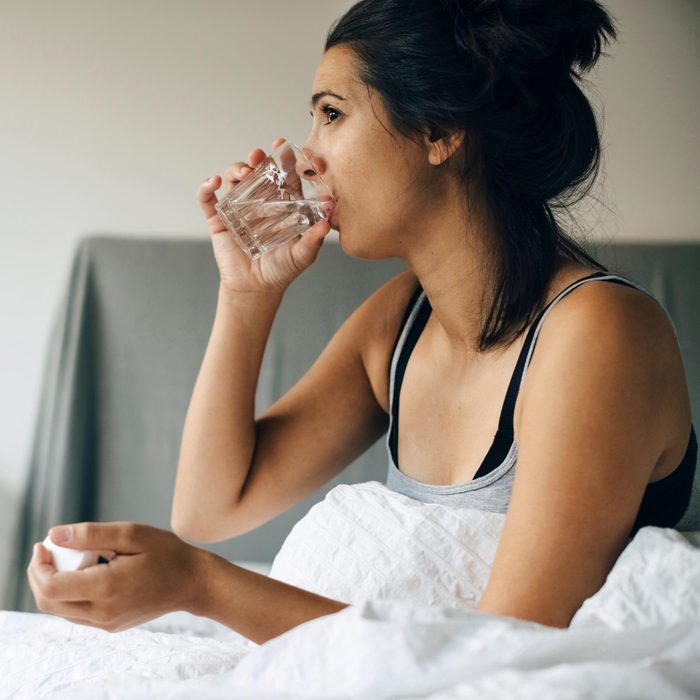Here’s How Much Water You Lose When You Sleep, According to an Expert
Updated: Sep. 08, 2023

Sleep is an often-unsuspected culprit that causes dehydration. A doctor explains the intriguing science for why this occurs.
Hydration has been top-of-mind during a summer with some of the hottest days ever on record, especially for people who love to exercise outdoors. However, you might not realize that one of the most dehydrating activities takes place all year round during a period when you’re not active at all. That’s when you sleep.
Get The Healthy @Reader’s Digest newsletter
Here’s how much water you lose when you sleep
If you weigh yourself before bed and again when you wake up, Shawn Nasseri, MD, a medical doctor in Los Angeles, says you’ll most likely find yourself half a pound to even two pounds lighter.
What happened overnight? Dr. Nasseri says it’s most likely you’ve shed water weight.
He explains that everyone loses water when they sleep—it’s a normal part of our metabolic functions. It’s estimated that a person loses about 0.5 to one liter of water during an eight-hour night of sleep. This translates to about one or two pounds of water weight.
The exact amount of how much water you lose when you sleep varies based on several factors, like your body size, gender, metabolism, room temperature, air humidity, and how much you’d been sweating during the previous day.
It’s the science behind this that’s pretty fascinating, and Dr. Nasseri’s specialization as an an ear, nose, and throat surgeon makes him a prime expert to break it down.
7 Best Foods to Prevent Dehydration, from Nutrition Experts
How you lose water in your sleep
There are two main means through which you lose water in your sleep: Respiration and perspiration. Together these bedtime events are called “insensible water loss”—given this name because you don’t feel the water loss with your senses. (As opposed to crying or urinating, when you’re more conscious of the water that’s leaving your body.)
The process works like this: The air you breathe in needs to be humidified for your body. The water your body provides for humidification is then breathed out when you exhale, leading to a loss of water in the form of water vapor, Dr. Nasseri explains. Some conditions, like mouth breathing, can increase how much water you lose during your sleep (which partly explains that major case of dry mouth in the morning).
Another source of nighttime water loss is through perspiration evaporating from your skin…in other words? The night sweats. Some people are naturally sweaty sleepers, while others sweat more due to hormone changes, pregnancy, or illness—all of which can lead to additional water loss.
Sweating during sleep depends on some non-physiological factors, like the temperature of your room, what you wear to bed, whom you sleep with, and how many blankets you use.
Dehydration and Anxiety: How to Boost Your Mood with Water
Do you need to worry about losing water while you sleep?
Dr. Nasseri reassures: This isn’t something you need to stress about—as long as you’re drinking enough water during waking hours. The body tightly regulates its water balance so your thirst and kidney function will work to maintain proper hydration levels, he says. Your body will naturally compensate for that water loss by prompting you to drink water when you wake up (hydrate before you caffeinate!) or throughout the day.
A bonus, according to Dr. Nasseri: Staying well hydrated throughout the day will also help you sleep better at night.
Get The Healthy @Reader’s Digest newsletter and follow The Healthy on Facebook and Instagram. Keep reading:
- 11 Secrets of Doctors to Manage Their Blood Pressure
- 7 Best Foods to Prevent Dehydration, from Nutrition Experts
- 9 Canned Foods Nutritionists Actually Buy—and 2 They Don’t
- Have a Chronic Illness? Here’s a Gentle Script to Set Boundaries, from a Psychotherapist and Bestselling Author
- I Drank Energy Drinks Every Day for a Week—Here’s What Happened














